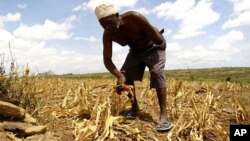Kenyan farmers are looking forward to better crops after this year’s rainy season, thanks to help from the food and agriculture organization, the FAO.
The organization is helping farmers prepare their fields to conserve rain water for crop use and to prevent soils from being washed away. This will help prevent food security crises in the future.
Farmers in Kenya have been affected by drought for the past three-four seasons.
Dr. Paul Omanga, crop production officer for the FAO in Nairobi, said one of the things they are encouraging farmers to do is plant drought tolerant crops.
“The drought tolerant crops are those crops that can tolerate drought. They can grow with minimal rainfall, minimal moisture. There are crops such as sorghum, cowpeas, green gram, pigeon peas, millet. These crops are usually grown by farmers in dry land areas,” said Omanga.
He said sometimes during droughts farmers do not have seeds, so the FAO along with the help of development partners buy seeds and distribute them to the most vulnerable farmers.
In addition, Omanga said the FAO is also working with farmers to do soil and water conservation interventions.
“The FAO facilitates the farmers through cash for work to dig terraces on their own farms in groups of 20-30 households, and they work assisting each other in digging these terraces,” said Omanga.
The terraces conserve the soil and prevent soil erosion, as well as conserve rainfall for crop use.
“You find in most vulnerable households the members of the families cannot do this because at the time they are supposed to be conserving their farms, they go to work for better off households to help meet their household needs,” explained Omanga.
Omanga said by having families work in groups they are better able to do soil and water conservation on their on farms, thereby improving their crop production at the end of the season.




